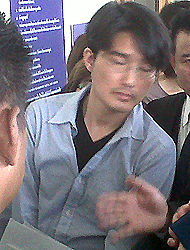Thai court begins Japanese cameraman inquest | Bangkok Post
Achara Ashayagachat, May 21, 2012
An inquest into the death of a Japanese
cameraman killed during the clash between the military and
anti-government protesters on the night of April 10, 2010 began on
Monday morning.
Yusuke Muramoto, 43, the only brother of Reuters' cameraman Hiroyuki
Muramoto, testified in the Bangkok Southern Criminal Court where the
inquest into two other deaths from same incident also began.
The court was first advised that Mr Muramoto had a team of lawyers appointed to represent him.
 Yusuke Muramoto, the brother of Hiroyuki Muramoto (Photo Achara Ashayagachat)
Yusuke Muramoto, the brother of Hiroyuki Muramoto (Photo Achara Ashayagachat)
Mr Muramoto, together with three members of the Japanese Embassy,
then broke off for a private discussion outside the courtroom with the
prosecutor and the defence lawyers and Wichit Suksriplang, a manager of
the 111 Foundation.
The public prosecutor, acting as a petitioner for the inquest, told
him they had no problem with the appointment of a team of lawyers to
assist.
The four lawyers - Manit Jitjunglub, Jumroon Kaewjumnong, Peera
Limjarean and Jessada Chundee - were already at the court for the
relatives of the other two cases.
Mr Wichit explained to Mr Muramoto that the lawyers had volunteered
to represent him in court so that he did not have to be present in the
room all the time. Mr Wichit noted the inquest still could not bring the
culprit to justice. Another step was needed, but this was a
pre-requisite, he said to the Japanese delegation.
The public prosecutor returned to the court again and asked it to
merge all of the files of the three deaths into one inquest. The
two-member judging panel adjourned for half an hour before returning and
denying the request on the grounds that the death of the foreign
journalist should be treated separately.
The inquest into the death of Hiroyuki Muramoto, 44, began with his younger brother providing general information to the court.
He said he learned about his brother's death via the internet around midnight of April 11, 2010 while he was in Japan.
Right after hearing the news, Muramoto's parents and his widow flew
to Bangkok to identify the corpse and bring the body back home for
religious rites.
The public prosecutor asked why the younger Muramoto, not the parents
or wife, had come to testify in the court. Mr Muramoto said his parents
were old and his sister-in-law had to take care of two children.
"We would also like to know about the facts. What happened then, and
who killed Hiro," Mr Muramoto told the court through a translator.
During his lawyers' cross-examination, Mr Muramoto said he learned
his brother was killed during the clash, but a judge had recorded that
the cameraman was killed during the government crackdown.
He said he did not what weapon killed his brother. He only knew that
his brother was shot while carrying his camera and doing his job as a
Reuters' cameraman.
He said his brother worked for Reuters for about 15 years and had
covered many other assignments other than in Bangkok. He conceded that
governments in many countries in general did not provide protection and
care for the media.
The lawyers asked if he had tried to get information from Reuters
about the incident. He said he did but Reuters told him they could not
yet identify who killed his brother. He also sought information from
other sources but no one so far has been able to clearly explain it.
Throughout their quest for details, the Muramoto family has been assisted by the Japanese Embassy in Bangkok, he told the court.
The court set the next hearings for July 2 with 56 other witnesses. Mr Muramoto is to fly back to Japan on Tuesday.
There was a lot of Japanese media present for the inquest, but none
from Reuters. Tida Tavornseth, Dr Weng Tojirakarn and other red-shirt
supporters were also present.

 Yusuke Muramoto, the brother of Hiroyuki Muramoto (Photo Achara Ashayagachat)
Yusuke Muramoto, the brother of Hiroyuki Muramoto (Photo Achara Ashayagachat) Elisabetta Polenghi shows a painting of her siblings, including the late Fabio, in the middle.
Elisabetta Polenghi shows a painting of her siblings, including the late Fabio, in the middle.


